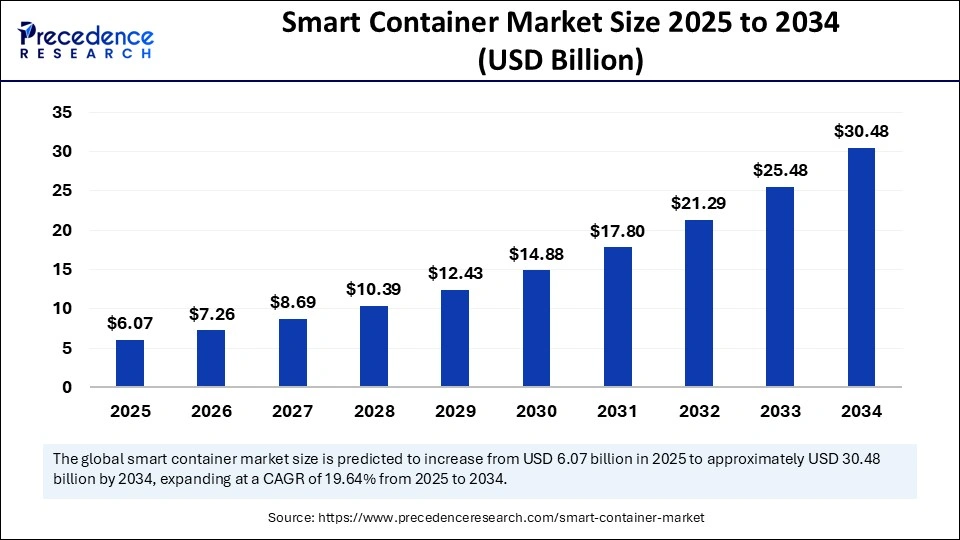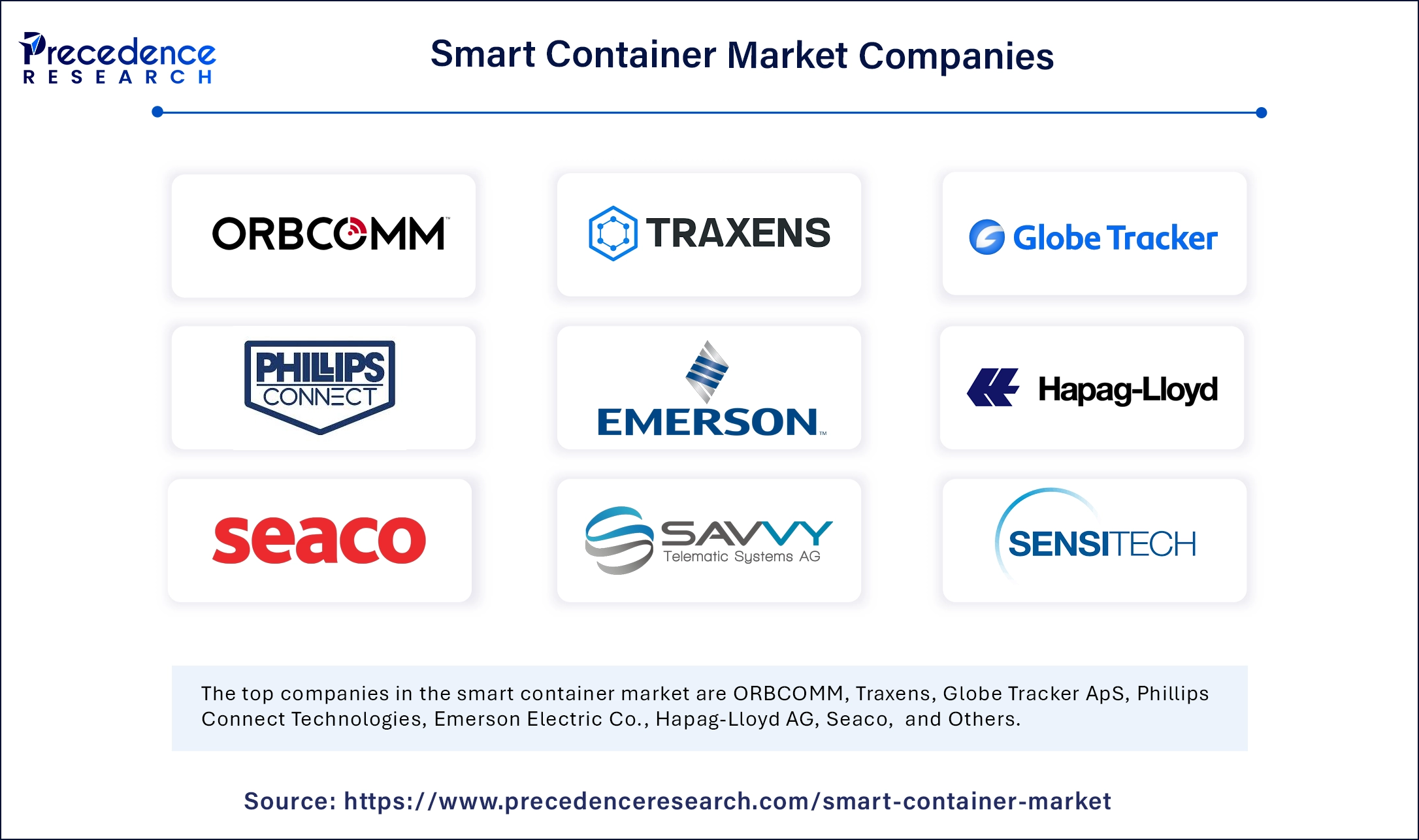The global smart container market size is estimated to cross around USD 30.48 billion by 2034 increasing from USD 5.07 billion in 2024, with a CAGR of 19.64%.

Smart Container Market Key Points
-
North America dominated the global market with the largest market share of 36% in 2024.
-
Asia Pacific is expected to witness the fastest CAGR of 20.64% during the forecast period.
-
By offering, the hardware segment contributed the biggest market share of 42% in 2024.
-
The software segment is projected to expand at the fastest CAGR during the forecast period.
-
By technology, the GPS segment accounted for the largest market share of 37% in 2024.
-
The LoRa WAN segment is anticipated to expand at the highest CAGR during the projection period.
-
By application, the asset tracking and management segment contributed the highest market share of 37% in 2024.
-
The supply chain optimization segment is expected to grow at the fastest CAGR between 2025 and 2034.
-
By end-use, the food & beverages segment held the major market share of 34% in 2024.
-
The pharmaceuticals segment is projected to grow rapidly in the coming years.
Smart Containers: Enhancing Logistics with Intelligent Tracking
Smart containers are shipping containers equipped with advanced sensors and IoT technology to monitor and manage cargo conditions in real-time. These containers track parameters like temperature, humidity, location, and security status, providing stakeholders with live data to ensure the safety and quality of goods during transit. This technology is especially valuable for sensitive shipments such as pharmaceuticals, food products, and hazardous materials.
By enabling real-time visibility and predictive analytics, smart containers help optimize supply chain efficiency, reduce losses, and improve regulatory compliance. They also support automated alerts for any deviations, allowing quick corrective actions and enhancing overall logistics transparency and reliability across global transportation networks.
How Does AI Influence the Smart Container Market?
Artificial Intelligence (AI) plays a significant role in the Smart Container market by enabling real-time monitoring and management of shipping containers. AI-powered sensors collect and analyze data on temperature, humidity, location, and security conditions inside containers, helping to ensure the integrity of goods during transit. This intelligent monitoring allows for proactive issue detection, such as spoilage risks or unauthorized access, which improves supply chain transparency and reduces losses.
Furthermore, AI enhances operational efficiency by optimizing route planning and container utilization based on predictive analytics. It enables smarter decision-making in logistics by forecasting demand, maintenance needs, and potential delays. This integration of AI drives greater automation, reduces costs, and supports sustainability initiatives, making smart containers more reliable and cost-effective for global trade.
Market Overview
The Smart Container market is transforming the logistics, shipping, and supply chain industries by integrating advanced technologies such as Internet of Things (IoT), GPS tracking, sensors, and data analytics into traditional shipping containers. Smart containers provide real-time monitoring of cargo conditions—including temperature, humidity, shock, and location—enabling better asset management, improved security, and enhanced supply chain visibility.
These containers play a vital role in reducing losses, ensuring regulatory compliance (especially for sensitive cargo like pharmaceuticals and perishables), and optimizing logistics efficiency. As global trade and e-commerce continue to expand, the demand for smart container solutions grows steadily, driven by the need for end-to-end transparency, cost reduction, and improved operational agility in increasingly complex supply chains.
Growth Factors
The expansion of global trade, coupled with rising consumer expectations for faster and more reliable delivery, significantly fuels the growth of the smart container market. The increasing complexity of international supply chains demands robust tracking and monitoring solutions that reduce risks associated with theft, damage, or spoilage. Technological advancements, including enhanced sensor accuracy, low-power wide-area networks (LPWAN), and cloud computing, have made it more feasible and cost-effective to deploy smart containers at scale.
Additionally, the growing adoption of Industry 4.0 concepts in logistics and warehousing supports the integration of smart containers into broader digital ecosystems, allowing real-time data sharing and predictive analytics that improve decision-making. Government initiatives aimed at modernizing port and customs operations also contribute to market momentum.
Market Scope
| Report Coverage | Details |
| Market Size by 2034 | USD 30.48 Billion |
| Market Size in 2025 | USD 6.07 Billion |
| Market Size in 2024 | USD 5.07 Billion |
| Market Growth Rate from 2025 to 2034 | CAGR of 19.64% |
| Dominating Region | North America |
| Fastest Growing Region | Asia Pacific |
| Base Year | 2024 |
| Forecast Period | 2025 to 2034 |
| Segments Covered | Offering, Technology, Application, End-Use and Region |
| Regions Covered | North America, Europe, Asia-Pacific, Latin America, and Middle East & Africa |
Get the Sample Copy of Report@ https://www.precedenceresearch.com/sample/5994
Market Dynamics
Key Market Drivers
One of the primary drivers of smart container adoption is the need for comprehensive supply chain visibility. Real-time data on container status helps stakeholders respond quickly to delays, reroute shipments if necessary, and maintain optimal cargo conditions, especially for temperature-sensitive goods such as food and pharmaceuticals. This transparency reduces financial losses and insurance claims while enhancing customer satisfaction.
Furthermore, smart containers help optimize operational costs by enabling predictive maintenance of containers and transport equipment, efficient route planning, and improved asset utilization. Increasing regulatory compliance requirements regarding cargo tracking and safety also compel shipping companies and logistics providers to invest in smart container technologies to avoid penalties and disruptions.
Opportunities
The smart container market offers significant growth opportunities through integration with advanced digital supply chain platforms that unify data across transportation modes, warehouses, and customers. Such platforms leverage data from smart containers to provide end-to-end visibility, automate workflows, and improve inventory management. The rising adoption of blockchain technology for secure and transparent transaction recording also complements smart container data, enhancing trust and accountability in logistics.
Moreover, sustainability trends emphasize reducing carbon footprints and waste in shipping operations, where smart containers can play a key role by optimizing routes, minimizing empty runs, and monitoring energy consumption in refrigerated containers. Emerging markets, with their expanding manufacturing and export sectors, present untapped potential for smart container deployment, especially as infrastructure modernizes.
Challenges
Despite its promise, the smart container market faces several challenges that may hinder faster adoption. High initial investment costs for sensor-equipped containers and supporting communication infrastructure can be prohibitive, particularly for smaller shipping companies and logistics providers. There is also complexity in managing the vast volumes of data generated, requiring robust analytics tools and cybersecurity measures to protect sensitive shipment information.
Interoperability issues between different technology providers and container operators can limit seamless integration and data sharing across supply chain partners. Furthermore, challenges related to battery life and durability of sensors in harsh marine and transport environments affect the reliability of smart container solutions. Lastly, regulatory uncertainty and lack of standardization in some regions slow down widespread deployment.
Regional Outlook
Asia-Pacific is emerging as a key market for smart containers due to its dominance in global manufacturing, exports, and rapidly developing port infrastructure. Countries such as China, India, Japan, and South Korea are heavily investing in smart logistics technologies to enhance competitiveness and comply with stricter export regulations. Europe also holds a significant share in the market, driven by stringent regulations on cargo safety, advanced digital infrastructure, and a strong focus on sustainable supply chains, particularly in the pharmaceutical and food sectors.
North America is witnessing steady growth fueled by large-scale adoption in freight, cold chain logistics, and integration with digital freight marketplaces. Latin America and the Middle East & Africa are gradually adopting smart container technologies as they upgrade logistics infrastructure and increase trade volumes, though growth is comparatively slower due to infrastructural and economic constraints.
Smart Container Market Companies

- ORBCOMM
- Traxens
- Globe Tracker ApS
- Phillips Connect Technologies
- Emerson Electric Co.
- Hapag-Lloyd AG
- Seaco
- Savvy Telematics
- Sensitech Inc.
- Robert Bosch GmbH
- A.P. Moller – Maersk
- Roambee Corporation
- Nexxiot
Segments Covered in the Report
By Offering
- Hardware
- Software
- Services
By Technology
- Introduction
- Global Positioning System (GPS)
- Cellular
- LoRa Wan (Long Range Wide Area Network)
- Bluetooth Low Energy (BLE)
By Application
- Asset Tracking & Management
- Supply Chain Optimization
- Safety & Security
- Others
By End-Use
- Food & Beverages
- Pharmaceuticals
- Oil & Gas
- Chemicals
- Others
By Region
- North America
- Europe
- Asia Pacific
- Middle East & Africa
- Latin America
Also Read: Smart Oil Dipstick Market
Source: https://www.precedenceresearch.com/smart-container-market